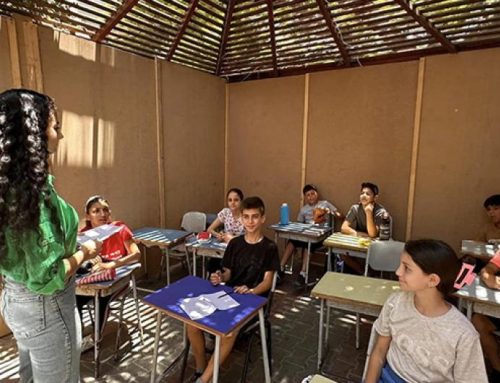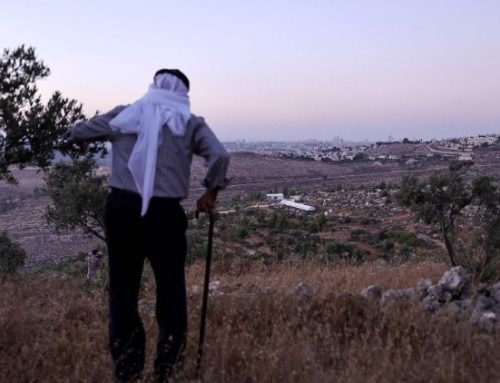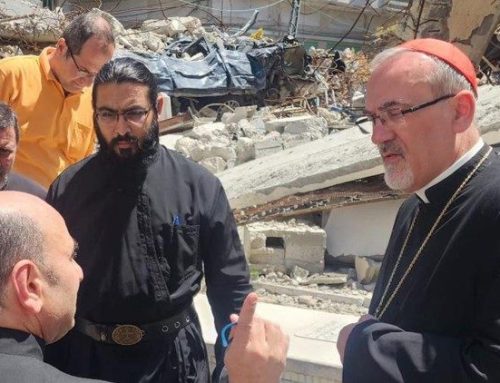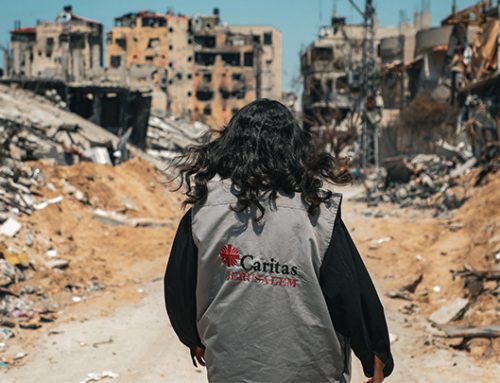1. The conflict of the Middle East is in itself a political conflict, but, in the East everything becomes animated with the religious feelings or memory. Therefore it has essentially a religious dimension, Jewish, Moslem as well as Christian.
Religious rights and political rights
1. The conflict of the Middle East is in itself a political conflict, but, in the East everything becomes animated with the religious feelings or memory. Therefore it has essentially a religious dimension, Jewish, Moslem as well as Christian.
The first question which meets us in this field is the following: do religious memories or roots in the land give a political right to the believers? Religious memories or roots give the believers the right to a free access to the land and the right of free worship in it. Indeed the three monotheistic religions have roots and memories in the land. Therefore, all of them, all believers of these religions, must have the same and equal right of free access and free worship in the land. As for the political rights for the peoples involved, they are to be determined according to the international law.
The second question is the following: whether religion allows and calls the believers to use violence in order to defend religion itself or the land considered as holy? Indeed, religion along history had given birth to many wars between nations and peoples, whether believing in the same or in different religion. This alliance between religion and war, or religion and violence, which appeared during history, and still appears in modern history, contradicts the nature of religion and its fundamental role. Religion links the human person to His Creator, and hence to all his brothers and sisters who are the creatures of the same God, whether they have the same belief or a different one. Therefore religion should be a factor of reconciliation and an obstacle before wars and quarrels and not the contrary.
Religious wars
2. By “religious wars”, the believer claims he is using force or violence to defend the rights of God. He maintains he is acting in God’s name, and he allows himself to destroy or to kill in God’s name. It is also true that religion is frequently used in support of other motives for war, both national and cultural. This phenomenon closely resembles certain manifestations of violence in the Old Testament; it is a frequent occurrence in the history of all religions, and is still present in people’s psychology in our day. It is not only in biblical times that violence is attributed to God; the same mentality continues in our times as well.
In itself, a “holy war” is a contradiction in terms. In his closing address to the meeting of the Eastern Patriarchs and Western Bishops following the Gulf War, Pope John Paul II declared, “there can be no such thing as a holy war”. Religion must lead man to love God and God’s children, the whole of mankind. “Anyone who says, “I love God”, and hates his brother, is a liar, since a man who does not love the brother that he can see cannot love God, whom he has never seen” (I Jn 4:20).
Therefore, to declare a holy war is therefore to go against the very essence of religion, and shows a lack of understanding of one’s own religion. It is reducing God to our human level of jealousy, quarrels and criminal hatred.
Different reasons can explain why this strange alliance between religion and violence appeared and still appears in the history of peoples. The essence of religion is misunderstood. The believer transforms religion into his own good and property, and under the pretext of believing in the true one God, he makes himself his own god and starts fighting for his own interests. So religious feeling becomes only a weapon in the soul of the believer, instead of being a factor of reconciliation and principle of mutual
Understanding and forgiveness. In this manner, the believer makes of himself the lieutenant of God and becomes the cruelest man in his pretension to impose the respect of the divine laws of the loving God.
Third, some political leaders, knowingly or unknowingly, use and exploit religion and the deep-rooted religious feelings of individuals in order to have one more weapon in their fight against enemies.
The conclusion is: religion is not in itself a source of violence and war. Only when religion is not understood, or is misused, man makes out of it a source of violence.
Violence and wars in the Bible
3. In the Bible, wars were done in the name of God. Victory and defeat were attributed to the presence or the absence of God, supporting his people against others who did not believe in Him.
But, at the same time, we see in the Bible that God reprimands King David and rejects him because he has shed so much blood. He does not allow him to build the Temple (cf. I Ch 22:8). The book of Proverbs orders the avoidance of the wicked for whom “wickedness is the bread they eat, and violence the wine they drink” (Prov 4:17). It condemns the use of violence: “The oppression of the wicked will sweep them away, because they refuse to do what is right” (Prov 21: 7). In Psalm 62 “Put no reliance on extortion, no empty hopes in robbery” (Ps 62:11).
The Prophets fiercely condemned the acts of violence committed by Israel: “There is no fidelity, no tenderness, no knowledge of God in the country, only perjury and lies, slaughter, theft, adultery and violence, murder after murder” (Hos 4:1-2). They also repeat Deuteronomy that demands that the rights of the stranger and the poor be respected. “A curse on him who displaces his neighbor’s boundary mark… A curse on him who tampers with the rights of the stranger, the orphan and the widow…” (Dt 27:19; cf. Dt 24:17; Ezk 22:7; Jr 22:3).
The book of Exodus insists on one and the same law for the citizen and the stranger: “There shall be one law for the native and for the alien who resides among you” (Ex 12:49). Concerning the rights of every person in general, Jeremiah says: “When all the prisoners in a country are crushed and trampled underfoot, when a man’s rights are overridden in defiance of the Most High, when a man is deprived of justice, does not the Lord see it?” (Lam3:35).
Physical strength is useless, says I Samuel, and Isaiah speaks of another source of strength: “For it is not by strength that man triumphs” (I Sam 2:9), but “Your strength is in tranquility and in complete trust” (Is 30:15).
The “suffering servant” in Isaiah is an introduction to the New Testament and prefigures Christ, who suffered for the salvation of humankind. He is the “Just Man” who “has done no wrong”, who is “crushed for our sins” and who “offers his life in atonement” (cf. Is 53).
Violence, holiness of God and justice
4. In the mindset of the times of the sacred writers, the use of violence is related first of all to the concept of God’s holiness, and secondly to the concept of justice and the way to preserve it among humankind.
Every transgression against God’s holiness or against a commandment of His law was subject to a physical punishment, even death. This explains the examples given above. In the case of the conquered towns, the law of the ban expressed the obligation to uproot idolatry and affirm the holiness and oneness of God.
As for the relation between violence and justice, we find the use of vengeance as a first stage in the establishment of justice between individuals and people. Vengeance consisted in responding to an evil with a greater evil. In the book of Genesis we read concerning Cain: “If anyone kills Cain, sevenfold vengeance shall be taken for him” (Gen 4:15), and in verse 24: “Sevenfold vengeance is taken for Cain, but seventy-sevenfold for Lamesh”.
In a second stage, in spite of its harshness, the “lex talionis” is a sign of progress in relation to the first stage. The excessive use of revenge is limited to an equal demand: one for one, and no longer sevenfold or seventy- sevenfold: “Life for life, eye for eye, tooth for tooth, hand for hand, foot for foot” (cf 19:21).
The book of Tobit reveals more progress in the way of dealing with one another: “Do to no one what you would not want done to you” (Tob 4:15)
The perfection of Revelation in the New Testament will bring tangible, revolutionary progress. The golden rule in dealing with others commands not merely avoidance of wrongdoing, but doing to others the good you would to be done to you: “So always treat others as you would like them to treat you” (Mt 7:12).
The law of love replaces the “lex talionis” (eye for eye, tooth for tooth), and brings about a revolution which demands love even of our enemies: “You have heard how it was said: Eye for eye and tooth for tooth. But I say this to you: offer the wicked ones no resistance… You have learned how it was said: You must love your neighbor and hate your enemy. But I said this to you: love your enemies and pray for those who persecute you” (Mt 5:38, 43-44).
Violence today
5. The harshness of the measures commanded by God in the Old Testament narratives to safeguard God’s holiness and justice among humankind seems strange to us today. We maintain that today we have more appropriate ways of showing these same truths through writing, explanation, preaching, and the use of the best means available. There is no need for us to pronounce anathema, or declare a war of extermination against those who do not believe in God in order to convince ourselves or others of God’s holiness, God’s uniqueness, and of the need for God’s law to be observed.
And yet if we are sincere, we must confess that in the 20th century, many of us still have the mentality that we condemn in the Old Testament. Even today, examples can be found of this mentality that demands the imposition of physical punishment for the religious, spiritual transgression of God’s law. Some still believe in wars of religion. Some still turn to violence or more insidious means to triumph or convince others in religious or other fields.
In the Middle East conflict, God is part in the conflict. Because the land is holy for all the parts. He is part in very different ways, according to every party’s view. The biblical concepts of the covenant, the chosen people, the promised land, are used not by all, but by some groups, not just in their theological significance but also in a literal political meaning, and become a support of political or military action against the other who is the Palestinian. The fundamentalist Christians so called Zionist Christians are also using religious concepts or views to support political or military Israeli realities. Palestinian Moslems respond by saying all of Palestine is a Moslem sacred land. Hence the necessity of defending the land, hence the concept of the martyr, dying for the land of God is dying for God, and hence the concept, pushed to the extreme, gives birth to the suicide killing.
But we must say, that now in the Holy Land, and within the frame of the conflict between Israelis and Palestinians, it is not only this negative aspect of religion which is manifest. In fact, many positive efforts are also there. Many groups of dialogue between Christians Moslems and Jews are there. One main group, which should be mentioned, is the so-called Alexandria group. Initiated by the Archbishop of Canterbury George Carey, with the agreement of political leaders, of Great Britain, Egypt, Mr Sharon and Mr Arafat, it took place for the first time in Alexandria on January 2002. Three delegations gathered representing the religious leaders of the three monotheistic religions in Palestine and Israel. They had to discuss, from the religious point of view, the ongoing conflict and manifestation of violence. On that first meeting, a declaration condemning violence in the name of religion was signed. This same document was presented to H.H. Pope John Paul II, during a public audience in March, then to other world personalities and institutions concerned with peace in the Middle East. The group met a number times after that in Jerusalem, and its last meeting was held in London, in Lambeth Palace, on October 2002. At that occasion the Coventry peace prize was given to the representatives of the three delegations. It is the first time, that heads of Churches of the three religions meet and from the land itself all Palestinians and Israelis. The meeting is still searching its way, but the fact itself of meeting is a symbol and a sign for the present and the future.
The role of religion and religious leaders is important. Some can be tightly linked with the political power, even as employees of the power, and therefore they cannot be free enough to use their religious mission and voice to give a direction different from that of the national interests and fears. Others, and from the three religions, who are not part of the political power, and who serve the people on an inferior level, can on the contrary give a speech different from the official one. It is difficult to oppose the official voice, it is difficult to find the right way to express this opposition: but this is the mission of the religious leaders to be different in their vision as they have to bring hope to situations, like the present in which hopelessness and feeling of being abandoned prevails, and to help both sides towards reconciliation in these moments in which any reconciliation seems to be a very far dream.
I hope, indeed that if not all of us, many of us, religious leaders, will be able to bear our mission and we will be helped by the grace of God to bring hope and reconciliation to both sides in this long and old conflict of the Middle East, with its center in Jerusalem and the Land made holy by God and made the land of Redemption and reconciliation between men themselves, and between them and God.





